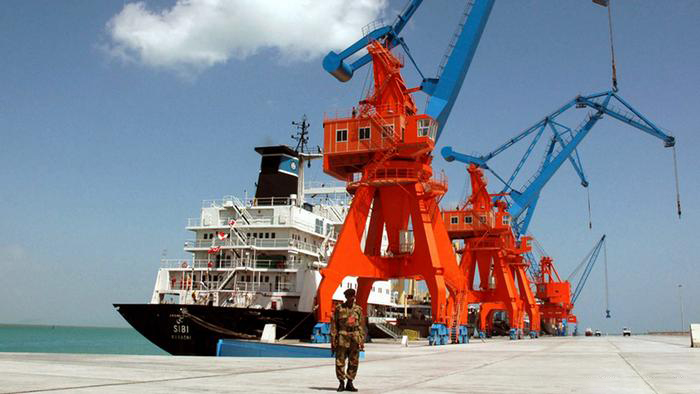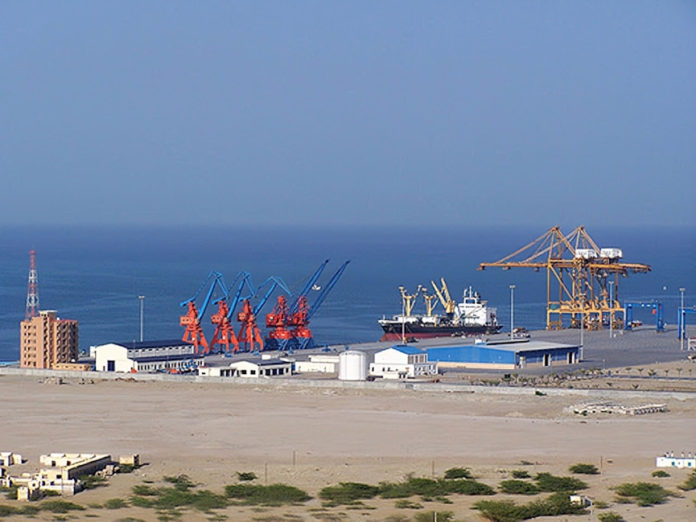Pakistan and China enjoy an all-weather friendship that has endured the test of time. Pakistan was one of the first three countries that recognized Peoples Republic of China in 1950 and since then relations between our two countries have been on an upward curve. Beginning with establishing diplomatic ties in 1951, both countries have–over the period of time–strengthened mutual cooperation in all spheres, especially economic and military. The trade between Pakistan and China was recorded as US$ 16Bn in 2015. The China Pakistan Economic Corridor project with investments worth US $ 46 Bn and Gwadar port as its lynchpin would give further fillip to the already strong bonds of friendship and bring prosperity to the entire region. However, there are intrinsic challenges to any project of such proportion both onshore and at sea which need to be guarded against. Cognizant of these challenges Pakistan Army has raised a Special Security Division to guard against these challenges ashore along the CPEC route while Pakistan Navy is according high priority to the security of Gwadar port, its approaches and the sea lanes leading to/from the port.
Since oceans link countries far and wide and provide easy access, mankind has used the sea for commerce and trade for more than 3,000 years. Battles have also been fought at sea to protect and deny this trading privilege and project military power ashore, which had a significance impact on Geo-politics and shaped the world as we see it today. Coastal regions, those less than 80 km from the sea, hold two thirds of the world’s population. Thus 90 percent of intercontinental trade is sea-borne and is served by over 4000 major ports and approximately 89,464 plus commercial ships. Sea is the most economical mode of transportation and also provides valuable mineral and sea food resources. It is important to highlight that transportation of freight by sea is approximately 10 times cheaper than rail, 45 times cheaper than road and 163 times cheaper than air.
According to the Journal of the Indian Ocean Region, more than 80 percent of the world’s seaborne trade in oil transits through Indian Ocean choke points; with 40 percent passing through the Strait of Hormuz, 35 percent through the Strait of Malacca and 8 percent through the Bab el-Mandab Strait. Half of world’s container traffic passes through Indian Ocean, the ports of which handle about 30% of world trade. In addition, 55% of known world oil reserves are present in the Indian Ocean, and 40% of the world’s natural gas reserves are in its littoral states. The dependence of world energy demand on the Indian Ocean littoral states makes it imperative to maintain freedom of navigation and maritime security in the Indian Ocean so that the life blood of global economy keeps running. The dependence of the industrialized world on Gulf oil is enormous, hence any interruption of this traffic would have devastating effects on economies of developing as well as the developed countries and may create global energy crisis. In this backdrop, developing a port at Gwadar makes economic sense for China. Its oil and cargo from the Persian Gulf has to travel 10,000 kms miles over sea and 4600 kms over land to reach Western China, while the Gwadar-Kashghar route shortens this distance to 2500 kms. Strategically, China’s shipping has to pass through the choke point of Malacca Strait which remains under the watchful eyes of the Indian Navy. Hence, developing a port and utilizing the Gwadar-Kashgar route is both strategically and economically important for China.
In line with China’s “One belt One Road” concept, CPEC and Gwadar port project would provide a most economical route for trade connectivity between China and the rest of the world over land and at sea. The CPEC (3,218 kilometer route) will connect Kashgar in China’s western Xinjiang region to the port of Gwadar and by doing so, this corridor will not only facilitate the trade between Pakistan and China, but will also provide a path to the regional and global connectivity.
Further, Gwadar port and CPEC will also provide better connectivity to the energy rich Central Asian Region (CAR). CPEC is, therefore, the gateway to China’s Silk Road and Gwadar port is the linchpin, which will not only become a transit and trans-shipment port for the Central Asia, but can also be used as a hub port for the Gulf States. Presently, heavy shipping has to transit through the Strait of Hormuz to reach the Gulf States; after full operationalization of Gwadar port, bigger ships could offload their cargo at Gwadar port, which could be transported to the destinations in Gulf through “feeder” vessels. This arrangement would be feasible for both the shipping community and the trading states. Therefore, Gwadar would be the hub of the regional economy benefitting the entire region.
The role of CPEC and Gwadar port towards integration of regional economies in particular and global economy in general is widely acknowledged. These projects will inevitably integrate the economies of the entire region. The integration of regional economies would promote shared interests, which would contribute towards the overall regional security environment by bringing the regional states together for common objectives.
Indian opposition to the project is considered unwarranted as the CPEC and Gwadar port project would benefit India as well. The current trade between China and India is estimated around US$80 Bn, CPEC through Gwadar provides a shorter route from China to the Indian western coast. Therefore, the transportation cost and time of the trade between China and India, carried through CPEC and Gwadar, will be reduced, which will open up new avenues of trade between the two countries.

The success of the CPEC and the Gwadar port project is linked to the safe and secure maritime environment in the Indian Ocean region in general and the Arabian Sea in particular. PN has adopted a multipronged approach to deal with the prevailing challenges such as beefing up security of Gwadar port, conducting security patrols and coastal exercises, enhancing Maritime Domain Awareness and engaging in Collaborative Maritime Security with regional and extra-regional navies. It is pertinent to mention that security of Gwadar port, its infrastructure, Chinese personnel working within port and harbor defence responsibility have been entrusted to Pakistan Navy. PN has deployed a Force Protection Battalion (FPBn) of Pak Marines alongwith requisite assets and equipment, both afloat and ashore, to ensure security of the Port and the Chinese personnel. This deployment will be further augmented with the proportionate increase in trade and associated activities in the Port.
To safeguard against any asymmetric threat to Pakistani ports and coast Pakistan Navy is regularly conducting Coastal Security Exercises involving all stakeholders with special focus on seaward security of Gwadar port in the wake of the upcoming CPEC project. An important strand of seaward defence and security is keeping maritime area of interest under continuous surveillance and monitoring. In this regard, a network of radars, electro-optic sensors and pickets are being setup to plug the gaps in our surveillance. This would help mitigate threats from non-state actors and help generated a timely and well coordinated response.
PN is playing the lead role in strengthening maritime and coastal security setup through establishment of Coastal Watch Stations and Joint Maritime Information Coordination Centre (JMICC). The JMICC acts as the nerve centre for collecting and collating information related to Maritime Security in order to synergize responses of multiple agencies undertaking operations in maritime domain. At present, JMICC is coordinating actions amongst 35 organizations within Pakistan and a number of international organizations.
Considering the nature of maritime challenges, no nation has the wherewithal to handle them alone. Pakistan Navy therefore regularly engages with regional and extra-regional navies to improve interoperability and deal with maritime crimes. In 2004 Pakistan Navy joined the US led multi-national Task Force-150 which is aimed at countering maritime terrorism and other illicit activities. PN’s participation in the Task Force has been one of the highest among the participating navies, second only to the United States Navy. Besides these, PN regularly undertakes regional engagements with all the littoral states of the IOR. Navies world over are an essential appendage to state’s foreign policy and significantly contribute in development of interstate relations. PN, being fully conscious of the fact, strives to foster stronger relations with regional and extra-regional navies to support our foreign policy objectives. As part of continuous development process, PN is building maritime infrastructure all along our coast, which will further enhance poise and sustained reach in the area.
Needless to say that, CPEC project will integrate the economies of the entire region. China will benefit from shortest access to the Indian Ocean to reach the markets of Middle East, Africa and Europe. The landlocked Central Asian Region will also be linked to the rest of the world through CPEC, Gwadar port and the sea lanes of the Indian Ocean. The integration of regional economies would promote shared interests, which would contribute towards the overall regional security environment by bringing the regional states together for common objectives. The forces inimical to the regional integration would, however, endeavour to disrupt the development of CPEC and Gwadar port for which Pakistan would continue to maintain its guard.
Pakistan is located at geo-strategic location and this benefit can only be fully exploited to our advantage through the development of a strong Navy for effective seaward defence and acting as a source of security for national and international trade plying off our coast. The Navy can thus be instrumental in translating the strategic location of our country into meaningful effects and promoting the national cause. Seaward security of Gwadar port and the CPEC is of greater significance than security on land due to its strategic and economic implications. Through effective implementation of PN envisioned plans and strategies, PN shall INSHALLAH continue to protect the nation’s maritime interests and maintain required deterrence.




